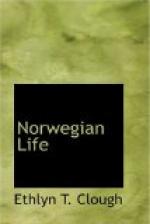There is something essentially, almost ludicrously, modern about the creation of Norway’s new king. Not that it is the first time a sovereign has been, so to speak, “custom-made.” An eligible foreign prince is tendered a seat upon an ancient throne; the form is old, but the spirit, how new! Republican though she is to the backbone, Norway has elected to be governed by monarchical methods, fearing with her isolated and primitive peasantry, to put the machinery of control into the hands of the people themselves. She must have a king, but he shall be of a new variety; in short, a republican king. She will not even have him addressed as were the monarchs of old, by the Norwegian equivalent of “Your Majesty.” He shall be just Herre Konge, plain “Mister the King.”
Even as the Norwegians welcomed Haakon VII to their shores, they took pains to show him clearly his rightful place. In his address delivered to the newly arrived sovereign on board the battleship Heimdal, Herr Michelsen, President of Council, and for six months virtual President of Norway, used these significant words: “For nearly six centuries the Norwegian people have had no king of their own. To-day a king of Norway comes to make his home in the Norwegian capital, elected by a free people to occupy, conjointly with free men, the first place in the land. The Norwegian people love their liberty, their independence, and their autonomous government which they themselves have won. It will be the glory of the king and his highest pleasure to protect this sentiment, finding his support in the people themselves. This is why the Norwegian people hail you to-day with profound joy and cry, ’Long live the King and Queen of Norway!’”
Was ever so frank a bargain driven with a king before? “Behold,” says Norway in effect, “you may sit on a throne; but beware how you attempt to king it over us. We will give you a salary to transact our official business and act as official figurehead. But you must never overlook the fact that it was we who made you and not you yourself.”
Is it any wonder that when asked to undertake to govern a people so independent, so proud spirited as this, Prince Karl of Denmark took time to think? Or that he asked for a popular vote that he might know how large a proportion of the frei people of Norway really wanted him for a king?
This was not the only reason why he hesitated. Being himself on his mother’s side a Bernadotte, he could scarcely ascend the Norwegian throne without the friendly sanction of Sweden. Moreover, his wife, Princess Maud of England, was more than reluctant to undertake life in Christiania and the duties of queenship. Lastly, Prince Charles himself ran a shrewd risk in assuming the crown, lest, should his relations with Norway become difficult, he might be forced to resign, and find himself—having abandoned his naval career for the throne—in a state of abject poverty.




